- News
ULS continues with its self-assessment process and begins critical analysis, after successful massive consultation with key informants
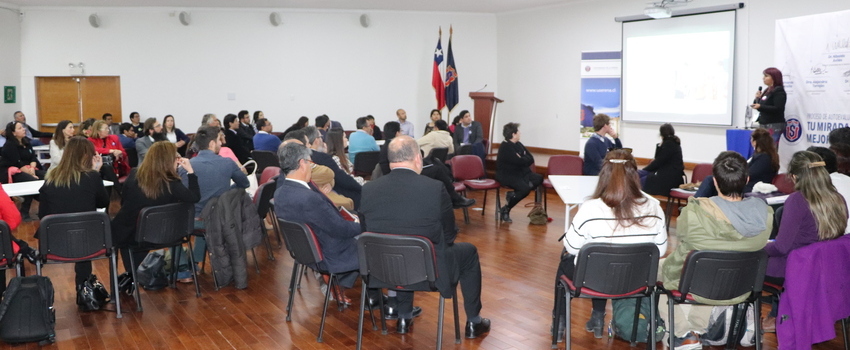
In the third plenary session of the Self-Evaluation process, the members of the 4 Subcommittees had reasons to celebrate: a successful consultation with key informants allows them to face critical analysis in time and with ease, thanks to the fact that the results of the survey are available in online, through the Phoenix platform.
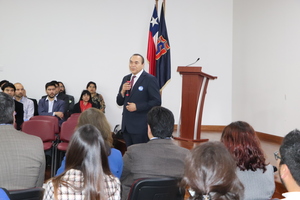 In May 2019, when they were just established as Subcommittees, the work of massively convening the university community to express their assessments of the institutional direction in those aspects evaluated by the National Accreditation Commission, CNA, seemed distant and difficult.
In May 2019, when they were just established as Subcommittees, the work of massively convening the university community to express their assessments of the institutional direction in those aspects evaluated by the National Accreditation Commission, CNA, seemed distant and difficult.
Four months later, the task is done and the 130 members of the Subcommittees face the critical analysis subphase, comparing institutional data with the standard of other similar institutions and the perception of key informants. Everything, to culminate in a diagnosis of strengths and weaknesses that guides improvement actions.
In this way, the third plenary session was the instance in which the subcommittees heard from the Executive Committee of Self-Evaluation, the overall result of the Consultation with Key Informants and learned about the dashboards in which they can access the data, make queries with specific filters and thus enrich the critical analysis.
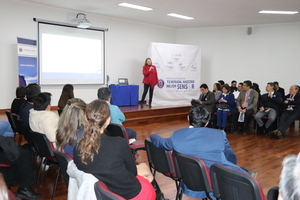 “One of the advantages of having Phoenix and intelligence systems for institutional information is that processes like this gain agility and access. In less than a week it was possible to collect the tabulated data on the platform and give access to each of the members of the Subcommittees,” explained the Director of Strategic Development and Quality ULS, Dr. César Espíndola, who, accompanied by the Director of the Center of Informatics and Computing (CICULS), Mg. Andrés Moya, gave an account of how what was planned and mandated by the Subcommittees was carried out successfully in meeting self-imposed goals and in record time.
“One of the advantages of having Phoenix and intelligence systems for institutional information is that processes like this gain agility and access. In less than a week it was possible to collect the tabulated data on the platform and give access to each of the members of the Subcommittees,” explained the Director of Strategic Development and Quality ULS, Dr. César Espíndola, who, accompanied by the Director of the Center of Informatics and Computing (CICULS), Mg. Andrés Moya, gave an account of how what was planned and mandated by the Subcommittees was carried out successfully in meeting self-imposed goals and in record time.
Likewise, both presented the dashboards displaying the results of the institutional surveys, organized by key informants, namely, academics/teachers, non-academic officials, undergraduate students, postgraduate students, graduates, postgraduates. , collaborating institutions and employers.
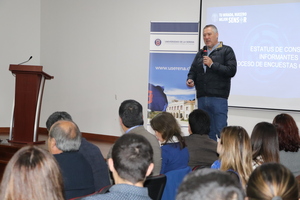 Overcoming Weaknesses Previous Agreement, Teaching Area
Overcoming Weaknesses Previous Agreement, Teaching Area
During the plenary session, the presentation of the status of overcoming weaknesses in the area of Undergraduate Teaching, of the 2016 accreditation agreement, was also made.
Just as the Environment Liaison area did in the previous plenary session, the weaknesses reported by the Agreement were reviewed one by one and judgments and evidence were provided regarding their status of improvement, constituting a highly interesting instance for the audience that contributed with new information, complementing the report.
Those in charge of reporting on the Teaching area were the Academic Vice-Rector, Dr. Alejandra Torrejón, and the Director of Teaching, Dr. Pamela Labra.
From data to stories and vice versa
Finally, and with a view to the process of writing the Self-Assessment Report of each subcommittee, the Director of Strategic Communication ULS, Mg. Carola Espinoza, conducted a Corporate Storytelling workshop, in response to the need to prepare a self-assessment report that balances the communication of data with the communication of institutional stories, emphasizing that the objective of the process is the culture of continuous improvement of the quality and for that, he explained, it is necessary to communicate a story and not just inform.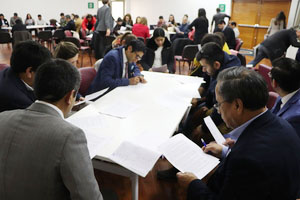
“Sometimes we forget that data, by itself, helps us understand reality, but it is not enough to drive improvement action. They help us become aware, but they do not necessarily activate our vital energy towards change. That is why the invitation, from a communication point of view, is to take advantage of this self-evaluation process to reinforce our identity, convert the objective of continuous improvement into a shared purpose that gives us internal unity and aligns us around making the ULS a better university every day. ”, he stated.
The next plenary session will be held on November 13, the date on which the Subcommittees will deliver a first draft of their respective chapters, in order to receive guidance from the Executive Committee.
If planning continues, by mid-December, the work of the Subcommittees will have concluded and will give way to the comprehensive construction of the Institutional Self-Assessment Report.
